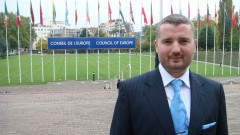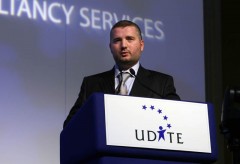06/12/2012
Lisbon Forum discussed the Arab Season
Lisbon Forum 2012: "The Arab Season: from change to challenges"
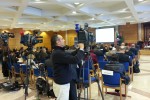
The 2012 Lisbon Forum took place on 3-4 December 2012 in Lisbon/Portugal. The event was organised by the North-South Centre of the Council of Europe in partnership with the UN Alliance of Civilizations. It took place in the framework of the Programme “Strengthening democratic reform in the southern Neighbourhood”, funded by the European Union and implemented by the Council of Europe.
The theme for this year’s Forum was "The Arab Season: from change to challenges". It was a follow-up to the previous year’s edition and focused again on the developments in the Arab countries of Northern Africa and the Middle East in order to take stock of the progress made - and obstacles met - on the path towards democracy. Particular attention was paid to new political élites, youth and women activists and to the process of democratic reforms.
The event report is to be found here while the full programme is available here .
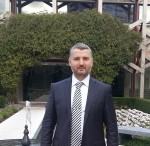
A flashback...
As member of the North-South Centre Think Tank of the Council of Europe, I had the chance to bring my modest contribution to the preparations of the Forum. Namely, I had worked on the initial elaboration of the concept of this year's Forum and actually had proposed its title "from change to challenges" (by the way, a title applauded by many speakers).
Besides, I had proposed to have also discussions on the local governments in the Arab world. This proposal was adopted by the North South Centre which finally entrusted me with moderating the Workshop 3 "Addressing the challenges of democratisation: political reforms, including the reform of local self‐government". This is my third participation in the Lisbon Forum. In 2010 I had moderated the session entitled “The prevention of radicalisation and religious extremism”, while in 2011 I was honoured with moderating the session on Tunisia, the pioneer of the Arab revolutions. This last experience had inspired me to write the article "Can Turkey inspire Tunisia", which was published in several newspapers in the Arab world.
* * *
Here below is the panel setting of this year:
The workshop conclusions have been presented at the closing session of the Forum by Younes Sekkouri:
The session started with a brief introduction of the topic by the moderator stressing the importance of local self-government reforms as a major challenge of democratisation in the Arab world. Then different speakers addressed the issue from various perspectives:
- The Moroccan experience introduced by Mr Sekkouri Younes, Parliamentarian, pointed out the necessity of a complementarity between the central and local governments and the need of identification among the population with the elected bodies. Mechanisms of a better participation are to be found not only in the voting process, but also in involving citizens to follow up the management of their local affairs.
- Mr Tarak Mahdaoui, Member of the Independent High Body for Elections in Tunisia, outlined the situation under the prism of serious regional disparities, which were source of the socio-economic claims in early 2008 and of the source of the Tunisian Revolution in 2011. He pleaded for better regional development policy in the new Tunisia and for political responses to the problem by strengthening the decentralisation and assuring better representativeness of local bodies.
- Mr Christophe Rouillon, Member of the Committee of the Regions witnessed of the French experience in local government and pleaded for more solid European approach in development cooperation. He stressed that in the difficult times of crisis a tendency is to cut from the budgets related to external actions of the Union, which is a historical mistake given the importance of the developments in the neighbourhood to Europe itself.
The workshop panellists and participants formulated following recommendations:
- The institutionalisation of local government in the Arab countries should be properly addressed in the constitutions in order to stress its importance.
- The State's overall architecture should better separate between sovereign/national and local powers to enable complementarity and clarity between different levels.
- The relationship between central and local powers needs to shift from close tutelage to empowerment; the control of opportunity must transform into a control of legality a posteriori.
- Local governments should to be consulted systematically by central powers regarding all national policies that affect local competencies.
- Local governments should be provided sufficient financial autonomy, through increase of local revenues, increase of tax revenue shares and appropriate mechanisms of transfers for a more cohesive development of territories. Thus, regional disparities should be tackled through balanced regional and local economic development policies.
- Local governments should be able to form their associations, for better representation of their interests and better coordination.
- The popular participation in the local life should not be restricted to the election processes; various mechanisms of participatory democracy should be promoted.
- Equality and gender balance should be assured at local level and social groups with specific needs as well as minorities should be taken into consideration.
- The principle of subsidiarity should be promoted and respected; central governments should transfer competencies with sufficient resources to local governments. Thus, countries should seek for an appropriate equilibrium between decentralization and deconcentration.
- The status of a local elected official should be given a clear legal and financial framework in order to allow the good exercise of local responsibilities.
22:48 Posted in Activité | Permalink | Comments (0) | Tags: the lisbon forum, murat daoudov
14/03/2010
UMM to Play Role in Euro-Arab Dialogue
T.C. MARMARA BELEDİYELER BİRLİĞİ
UNION OF MUNICIPALITIES OF MARMARA
![]()
PRESS RELEASE
13.03.2010, Istanbul
UMM TO PLAY ROLE IN EURO-ARAB DIALOGUE
Murat Daoudov, the Director of EU and International Relations of the Union of Municipalities of Marmara (Turkey), has been nominated member of the high profile North-South Centre Think-Tank of the Council of Europe dedicated to the Euro-Mediterranean dialogue.
In the framework of the agreement signed between the Council of Europe and the London-based MBI Al Jaber Foundation with the objective of developing co-operation on Intercultural Dialogue in the Euro-Mediterranean region, a special think tank has been set up for four years under the coordination of the Centre for Global Interdependence and Solidarity of the Council of Europe (known as the “North-South Centre”). In line with the recommendations and policy guidelines outlined in the “White Paper on Intercultural Dialogue”, the partnership between the Council of Europe and the MBI Al Jaber Foundation focuses on strengthening Euro-Arab co-operation, and promoting education for human rights, rule of law, democratic citizenship and intercultural understanding. The agreement covers activities in the fields of research, support to in-service training and curriculum development, networking and discussion forums. 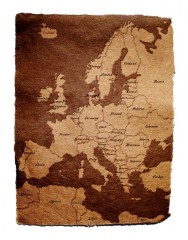
Speaking on the occasion of the signing the agreement, Council of Europe’s Secretary General Thorbjørn Jagland said: “Intercultural understanding is one of the main challenges of our societies: the Council of Europe has acted as a bridge in the last 60 years between different cultures in our Continent. Fostering dialogue is crucial for human rights’ protection and development. I welcome this agreement with the MBI Al Jaber Foundation. It will enhance co-operation in the Euro-Mediterranean region, building on the MBI’s extensive experience, know-how and contacts in the area.”
The official setting-up of the Think-Tank, composed of the representatives of the NSC “quadrilogue” (international organisations, governments, civil society and local authorities), will take place in Lisbon in May 2010, on the occasion of the 20th anniversary Ceremony of the North-South Centre and the Award of the North South Prize to M. Gorbatchev and R.Dashti.
Members of the Think-Tank
Chair of the Think-Tank: Mr. Eberhard KOELSCH, Vice-Chair of the North-South Centre Executive Council
Mr. Koelsch was Permanent Representative of Germany to the Council of Europe from 2006 until 2009. He is now a lecturer at Bonn University in Germany and a regular speaker at programmes of various political foundations and other institutions of adult education.
Mr Victor ANGELO, Special Representative for MINURCAT, United Nations Deputy Secretary General
Mr Angelo is currently the Special Representative for the United Nations Mission in Central African Republic and Chad (MINURCAT).
Ms Mbarka BOUAIDA, Member of Parliament, Chair of the Committee of Foreign Affairs, National Defence and Religious Affairs (Morocco)
Ms Bouaida is a member of the National Council of the National Rally for Independents (RNI), which forms a part of the current Moroccan governmental coalition. She is also a Member of the Economic Committee of the Parliamentary Assembly of the Mediterranean.
Mrs Alicia CABEZUDO, Professor
Alicia Cabezudo is a Professor and Peace/Human Rights Educator and Consultant. Until recently, she was the Director of Educating Cities Latin America.
Mr Murat DAOUDOV, Director of EU and International Relations at the Union of Municipalities of Marmara (Turkey)
Mr Daoudov works as Director of EU & International Relations at the Union of Municipalities of Marmara. He is also founding member of the Turkish Association of Local Government Managers - YÖNDER.
Mr. Mir Asghar HUSAIN, Adviser of Mohamed Bin Issa Al Jaber, Founder of the MBI Al Jaber Foundation
As a UNESCO international civil servant, Mr. Husain worked as an Education Planning Specialist in Africa, Asia, and some Arab countries. Later on he went on to become Director of Education Planning, Policies and Strategies at UNESCO, in Paris.
Mr Yohannes MEZGEBE, Vice-President of the Pan African Youth Union
Yohannes Mezgebe is founder of the Youth Corps, a non-profit organization working with and among young people from academic institutions and the wider community. He is also the Co-Founder of the African Youth Forum for Peace (AYFP).
Mrs Felisa TIBBITTS, Executive Director of HREA
Felisa Tibbitts is co-founder and director of the Human Rights Education Associates (HREA), an international non-governmental organisation. Mrs Tibbitts is also Adjunct Faculty at the United Nations University for Peace and the Harvard Graduate School of Education.
* * * * *
Press Contact:
Mustafa ÖZKUL (international media) +90.535.7833605 mustafa.ozkul@marmara.gov.tr
Fatih SANLAV (Turkish media) +90.532.7283341 fatihsanlav@marmara.gov.tr
Contact and information:
Murat DAOUDOV murat@marmara.gov.tr http://licencetothink.blogspirit.com
For Turkish text see http://www.marmara.gov.tr/newsdetail.aspx?newsId=866
*********************************************************************
MBB, Avrupa ile Arap Dünyası Arasında Köprü Kuracak
Avrupa Konseyi ile Arap Dünyası, Marmara Belediyeler Birliği (MBB) üzerinden ilişki kuracak. Marmara Belediyeler Birliği AB ve Uluslararası İlişkiler Direktörü Murat Daoudov, Avrupa Konseyi tarafından oluşturulan sekiz kişilik üst düzey Kuzey-Güney Tefekkür Grubu üyeliğine seçildi.
Avrupa Konseyi’nin Avrupa-Arap Dünyası diyalogu için oluşturduğu ve aralarında Birleşmiş Milletler özel temsilcisi, büyükelçi, parlamento komisyon başkanı, akademisyenler ve uluslararası sivil toplum örgüt yöneticilerinin bulunduğu üst düzey Tefekkür Grubu üyeliğine, Marmara Belediyeler Birliği AB ve Uluslararası İlişkiler Merkezi Direktörü Murat Daoudov atandı. Merkezi Strasbourg’da bulunan Avrupa Konseyi, önümüzdeki dönemde Akdeniz ve Ortadoğu havzası ile yakın işbirliği kurmak, Avrupa ve Arap Dünyası arasında diyalog geliştirmek ve kültürler arası diyalog anlayışı alanlarında yeni politikalar üretmek amacıyla, dört yıllık süre için bir beyin takımı oluşturdu.
Konuyla ilgili açıklama yapan Avrupa Konseyi Genel Sekreteri Thorbjorn Jagland, “Avrupa Konseyi, Avrupa kıtasında 60 yıl boyunca kültürler arası köprü vazifesini görmüştür. Şimdi ise, Avrupa-Akdeniz havzasında işbirliğini ve Ortadoğu Havzası ile diyalogu pekiştirecektir” dedi. Sekiz kişiden oluşan ve uluslararası kurumların, hükümetlerin, sivil toplumun ve yerel yönetimlerin temsilcileri, ilk toplantısını yapmak üzere, Mayıs ayında Lizbon’da düzenlenecek olan Avrupa Konseyi Kuzey-Güney İşbirliği Merkezi 20. Kuruluş Yıldönümü kutlamaları vesilesi ile bir araya gelecek.
Geniş bilgi için: http://www.marmara.gov.tr/newsdetail.aspx?newsId=866
22:18 Posted in Activité | Permalink | Comments (0) | Tags: coe, council of europe, euro-arab, euro-mediterranean
02/02/2007
Prix du Journalisme pour la Diversité Culturelle Euro-Med 2006
pour Hugue Dorzee et Murat Daoudov. *
Monsieur, Madame,
Comme vous vous rappellerez sans doute, en janvier et février de cette année une série d’articles portant sur l’organisation de la religion islamique en Turquie, le rôle de la Direction générale des affaires religieuses en Turquie et au sein de la communauté turque en Belgique avait été publiée dans le quotidien belge Le Soir. Cette série avait été réalisée ensemble par le journaliste du Soir Hugues Dorzée et Murat Daoudov, expert indépendant.
Nous sommes aujourd’hui très heureux d’apprendre que la série a reçu le "Prix du Journalisme pour la Diversité Culturelle Euro-Med 2006". Cette compétition est organisée par la Fondation Euro-Méditerranéenne Anna Lindh et la Fédération internationale des journalistes et nous sommes très honorés par une telle distinction.
Nous souhaitons exprimer toute notre gratitude à la Fondation Euro-Méditerranéenne Anna Lindh et à la Fédération internationale des journalistes. Nous remercions également la Fondation Roi Baudouin de Belgique et tous ceux qui nous ont aidé dans la réalisation de ce remarquable projet.
Hugues Dorzee - Murat Daoudov
WAFIN.BE
http://www.wafin.be/articles/national-56.phtml
* * * * * * * * * *

Cérémonie de la remise du premier Prix Euro-Med du journalisme sur la diversité culturelle, par la Fondation Anna Lindh et la Fédération Internationale des Journalistes à l’ Institut suédois à Alexandrie 10 septembre 2006 Déclaration au nom du jury Dr
Traugott Schoefthaler, Directeur exécutif de la Fondation Anna Lindh Pourquoi la
Fondation Anna Lindh et la Fédération Internationale des Journalistes ont créé un Prix Euro-Med du journalisme sur la diversité culturelle? La région euro-méditerranéenne, située des deux rives de la Méditerranée, englobe les 25 Etats membres de l'Union européenne, ainsi que leurs 10 voisins au Sud et à l'Est du bassin. Tous sont membres du partenariat euro-méditerranéen, mis en place il y a plus de 10 ans. Un de ses principaux objectifs est d’assurer le respect de la diversité culturelle et religieuse dans les sociétés ou il existent tant de diversité, mais peu de respect. Il n'existent même pas des connaissances mutuelles autre que superficielles. C'est pourquoi nous croyons que les journalistes font face à un véritable défi, et nous désirons encourager ceux qui font de cet objectif leur propre engagement professionnel. Pourquoi nous récompensons les jeunes journalistes? Tout simplement parce que ma génération a failli dans cette mission. Nous n’avons pas pris au sérieux les signes de méfiance et de frustration grandissantes envenimant les relations politiques comme culturelles entre le Nord et le Sud. Nous avons besoin de nouvelles idées et j'espère, comme l’ont fait toutes les générations précédentes, que les jeunes seront capables d'en faire mieux. Le fait de connaître nos propres défauts doit nous mener nous engager pour que l’on cède la place aux idées de cette jeune génération. Avant de vous présenter les lauréats du premier Prix Euro-Méditerranéen du journalisme sur la diversité culturelle, permettez moi de dire un mot sur les journalistes qui ont reçus une mention d'honneur; dans l'ordre alphabétique:
....................................
Hugues Dorzée:
J'appelle maintenant Hugues Dorzée, 34 ans, de la Belgique, lauréat pour son série d'articles "La Turquie d'Atatürk, Sainte république", publié en français en février 2006 dans le quotidien belge Le Soir. Le reportage a été réalisé avec le soutien de la Fondation Roi Baudouin et l'assistance de Murat Daoudov.
Il a reçu sont diplôme de journalisme de l'Université de Liège en Belgique, et a travaillé en tant que pigiste dans plusieurs maisons de presse belges. Depuis 1998 il travaille pour Le Soir, le quotidien français le plus important en Belgique. Il est spécialiste des questions de l'immigration et de l'intégration sociale, ainsi que les cultes et croyances religieux et sociaux. Les articles présentent en profondeur les relations, les ambiguïtés, les contradictions et la coexistence entre l'Islam officiel, les pratiques religieuses ainsi que l'idéologie laïque et les institutions existantes aujourd'hui en Turquie. En outre, ils se focalisent sur le rôle du ministère des affaires religieuses turque (Diyanet) pour la communauté turque à l'étranger, en prenant pour exemple le cas de la Belgique.
Le jury a estimé que ces articles sont le résultat d'un reportage bien conçu et bien structuré, évitant tous genres de jugement moral et donnant un espace pour des points de vue multiples. L'auteur fait disparaître cette obsession assez répandue d'islamophobie, en dépeignant l'Islam en tant qu'aspect régulier et bien organisé de la vie quotidienne. Il souligne aussi l'importance de la présence des institutions islamiques en Belgique, oeuvrant pour le bien-être des communautés musulmanes.
Félicitations à Hugues Dorzée et Le Soir.
20:44 Posted in Activité | Permalink | Comments (0)






